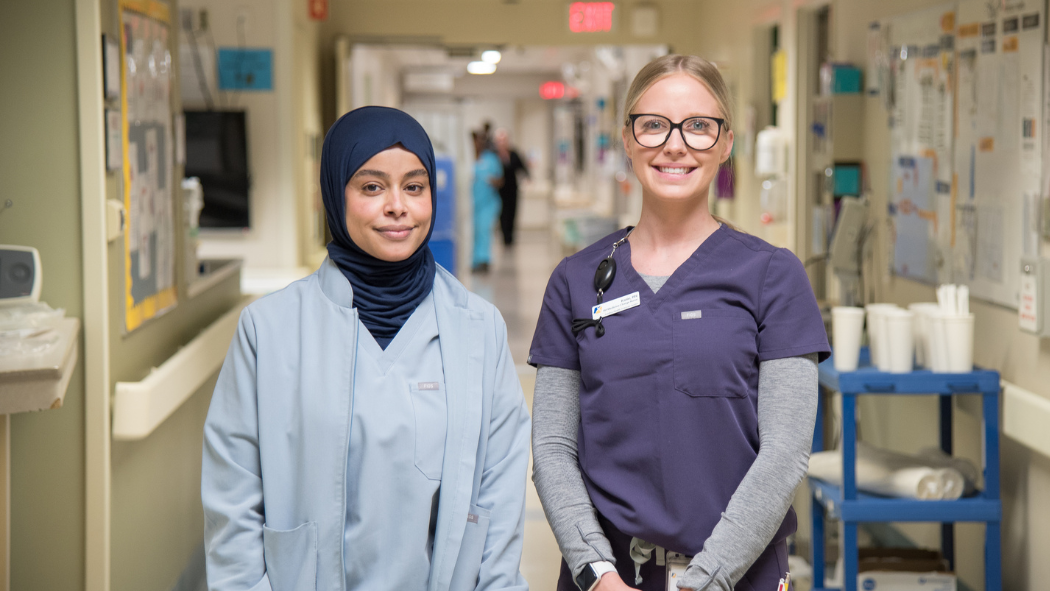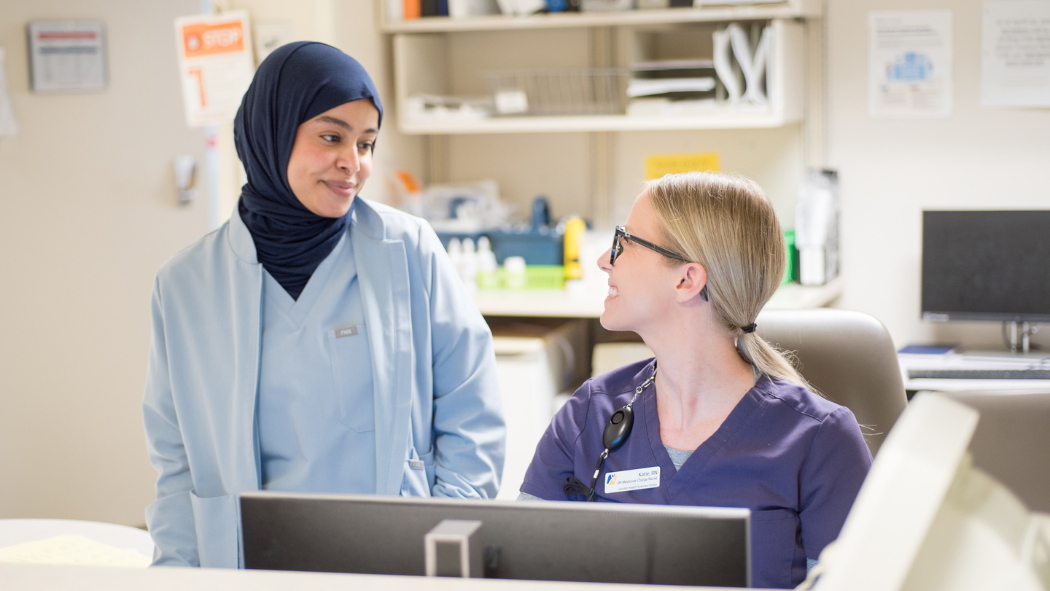
Pictured left to right: Nawal Ibrahim and Katrina (Katie) Koch on the medicine unit at Victoria Hospital
May 13, 2025
When Nawal Ibrahim began her career as a registered practical nurse (RPN) at London Health Sciences Centre (LHSC), she was confident in the skills she learned in school but was worried about translating them into practice.
Not long into her first assignment on the acute medicine unit, she learned she was eligible to participate in a program that would pair her with an experienced nurse known as a nurse coach, who would provide ongoing at-the-elbow support while she worked to build up her confidence in practicing independently.
The Clinical Nurse Scholar Program, which is funded by the Ontario Ministry of Health, is designed to support the development and retention of nurses. It allows nurse coaches to be placed in select units across LHSC so they can provide point-of-care support to new nurses like Ibrahim, as well as internationally educated nurses (IENs) and nurses looking to upgrade their skills.
Nurse coaches don’t have their own patient care assignments; rather, their role is focused on mentorship. They round on the floor, ensuring they’re present to guide team members through complex situations in real time. They also provide ongoing feedback to enhance their critical thinking, decision-making and problem-solving skills.
The program rotates through various units every three to six months. During each round, experienced nurses are hired internally to serve as nurse coaches. After their coaching period ends, they return to their permanent positions before the program moves onto another area. This rolling approach helps ensure as many nurses across LHSC benefit from the program as possible.

So far, more than 20 experienced nurses have become nurse coaches in areas like inpatient medicine, surgery and oncology, and more than 800 nurses have received one-to-one mentorship.
“This is an exciting opportunity for our new nurses to benefit from the incredible expertise of our experienced nurses,” explains Laura Rashleigh, Interim Director of Nursing Practice Excellence and Innovation at LHSC. “We know the first few years of a new nurse’s career can be particularly stressful as they transition, and this program is one of the ways we're saying, 'We see you and we are here for you.’”
Rashleigh says LHSC has seen a significant need for this type of support and has received overwhelmingly positive feedback from nurse coaches and their mentees so far. Perhaps most importantly, it’s keeping nurses of all experience levels engaged with each other and in the profession.
“When our nurses are learning and growing together, this has a significant, positive impact on the care we provide to our patients,” adds Rashleigh.
Ibrahim has felt the benefit of the program first-hand. She says her first time engaging with a nurse coach is one she will never forget.
On that day, she had a patient with a critically high level of potassium, which she had never experienced before. On the advice of a colleague, she called the nurse coaches over. They stayed with her for a few hours, walking her through the situation from beginning to end and providing much needed clinical and emotional support.
“I can't say enough about how kind and patient they were with me,” explains Ibrahim. “They made sure I knew it was a judgement-free zone and that they understood what I was going through because they remember being new in their careers once too.”
Katrina (Katie) Koch, a registered nurse (RN), is one of the nurse coaches that responded to Ibrahim’s call that day. Koch applied to the role because she has always been interested in leadership and cares deeply about the well-being of her colleagues.
“Being a nurse coach is not a responsibility I have taken lightly,” says Koch. “This experience has changed me as a nurse and fulfilled me in ways I couldn't have imagined. It’s an honour getting to pass on the tips and tricks I’ve learned throughout my career so far.”
When Koch started in the role, she built rapport with the more junior nurses by walking up to them and sparking conversations. She would ask for their name, their story and if there was anything she could do to help them. As time went on, she made sure she had a visible presence on the floor every day and that her new nurses knew they could call her any time about a problem, no matter how big or small.
“It’s the best feeling when I walk into the room and see that look of relief on their faces,” says Koch. “Knowing I’m here to support them through whatever might happen that shift really puts their minds at ease.”
Koch says some of the most common skills she’s helped new nurses with include PICC (peripherally-inserted central catheter) line dressing changes, giving medications through IVs, administering blood products and documentation for patient health records. Sometimes, she helps them find equipment and supplies if they don’t know where they are, as well as to navigate systems and processes within the hospital that are new to them.
“I’m so grateful for Katie and our other nurse coaches,” says Ibrahim. “Moving from school into bedside care can be daunting, particularly until we’ve built up the kind of experience that only comes with time – but having them by our side means we don’t have to be afraid.”
Ibrahim says she now looks forward to seeing nurse coaches around on the unit because it means she’ll have the opportunity to learn something new. When she sees them, they also take a moment to remind her they’re proud of how far she’s come.
"They have instilled a sense of confidence in me that I didn’t have before,” says Ibrahim. “The Clinical Nurse Scholar program is a game-changer for any new or internationally educated nurse and I’m proud to work at a place that supports us in this way.”